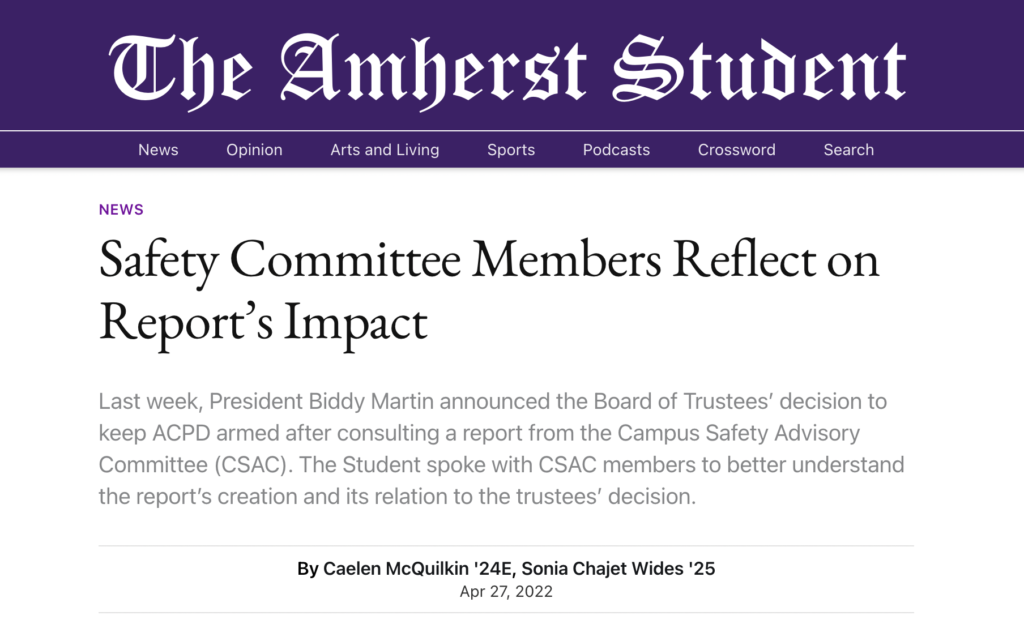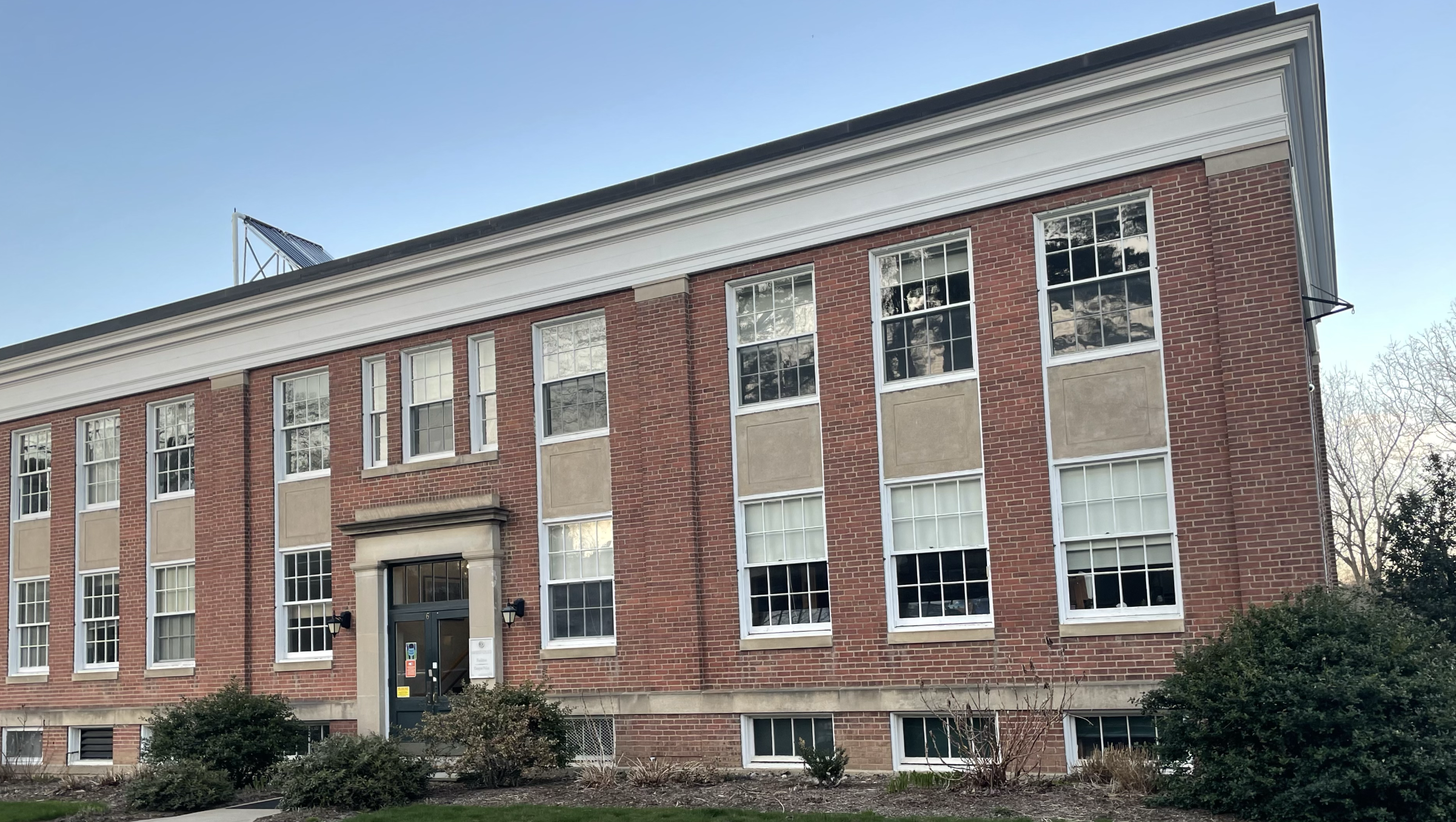Published in The Amherst Student on April 27, 2022


Last week, on April 18, President Biddy Martin announced that the board of trustees had voted to keep the Amherst College Police Department (ACPD) armed, despite repeated calls for disarmament from students over the last two years. The announcement came after the release of the final report that the Campus Safety Advisory Committee’s (CSAC) submitted to the board — the culmination of 10 months of discussions on safety and policing at the college.
In light of the decision, The Student spoke with members of the CSAC to better understand the process they took to create their report, their insight on the trustees’ decision, and further actions that the report recommends.
The CSAC was first formed last May as part of an initiative to rethink public safety at the college in response to student calls for changes to policing and safety infrastructure. The committee was tasked with generating options for a community safety model that would support the college’s commitment to equity and inclusion. While the committee’s findings were originally supposed to be presented in October 2021, the committee ended up extending its time to finish the report due to the breadth of the topic they were tasked with addressing, meeting almost weekly for much of the year, students on the committee reported.
The final report — which was submitted to the Board of Trustees in April — made recommendations on topics including policing, student mental health support, sexual violence prevention, and identity-based harm. As the board was only responsible for deciding whether the college would retain an armed police department, the committee recommendation pertinent to its decision was that the college should not disarm the ACPD, but should evaluate whether weapons could be stored until needed.
Although the board’s decision aligned with the recommendation against disarming ACPD, the trustees chose not to adopt the recommendation that officers store arms in a centralized location and no longer carry them on campus. “That certainly disappointed me, but I can’t say it surprised me or the other students on the committee,” said Eli Maierson ’23, a student member of the committee. “I do believe the report contains some good in it, particularly as it relates to restorative justice and student mental health. It’s just sad that that potential for immediate, impactful change was squashed very quickly.”
Maya Foster ’23, another student member of the committee, spoke on this decision-making process. “We also always knew that the decision [about police armament] would not be ours to make in its final iteration,” she said.
The committee as a whole never got a chance to speak to the Board about the report, despite the fact that the report was designed to advise trustees. “I feel like [that] actually would have been a very helpful conversation,” said Foster. “That idea was floated in a few meetings … and it just didn’t end up happening.”
“It was frustrating that we never got to speak directly with the Board of Trustees, who I believe were ultimately responsible for softening a powerful report,” said Maierson. “I do not have much insight into how they made their decisions other than what was provided in Biddy’s email.”
Along with Foster, Sofia Guerra ’22, a student member of the committee, attributed some of the trustees’ final decision to liability concerns. “They were worried [about] an active shooter scenario or just an ‘external threat’ … [if] ACPD couldn’t get their weapons from a certain central location, then that would be on the trustees,” said Guerra.
Foster also noted liability as a complicating factor in the decision-making process, and part of the reason for why she believes the trustees are more “conservative” on the issue. “I feel like to offset blame to only the trustees … excuses the work of the administration at large,” she continued. “There’s not a ton of room for the trustees to be able to say, ‘actually, we think you should disarm,’ because … then what happens? … [The trustees] don’t know what the day-to-day life of the college is.”
Guerra was unsure of how the administration could give committees like the CSAC the power to present what Foster calls “full, robust options” with the potential of actually being adopted. “I’m not sure how admin could have made it easier for us to have more of a say, and I’m not sure that it was necessarily in their interest,” she said.
“We even had to fight at the end [of the process] to say okay, these are [our] recommendations, we’re not just going to say ‘Oh, these are some options that we found.’ We formed opinions. This was a nine-month long effort, or more. We had to advocate for ourselves to have more of a say,” she said.
Foster considered this in the broader context of how change-making occurs in institutions like Amherst. “Even the board wasn’t given a fair chance to say that we should disarm the police … it’s not within the college’s structure to try to support large, drastic decisions like that. Until they are pushed to do so, they are not going to do it,” she said. “Even putting together 10 months of effort from a diverse group of people who feel like, at the end of the day, maybe disarmament is the answer … there is no structural support for that.”
Although the board did not accept the committee’s recommendation on arms, some of the report’s other proposals were adopted by various college offices.
On Tuesday, April 26, President Martin sent another email announcing the formation of a new campus safety advisory committee, accepting one of the original committee’s suggestions. The charge of this group is to “advise the Amherst College Police Department (ACPD), the Office of Student Affairs (OSA), and the College administration on campus safety policies,” with the goal of supporting “the College’s efforts to be responsive to the needs of the campus community and to provide advice on the implementation of fair, equitable, and effective campus safety and police practices.”
In the coming weeks, Martin will work alongside the AAS, the Committee of Six, and the Employee Council to find student, staff, and faculty representatives to serve on the committee, according to the email.
On this note, Foster and Guerra both expressed feeling much more empowered to create change on some of the topics outside of ACPD. “I do think they gave us a lot of power in terms of recommending things, specifically not about policing,” Guerra said.
Foster said that she understands why the report “gets reduced to being about the police and disarmament,” but remarked that she’d like to emphasize the “substantive” change that was done in other areas, particularly in mental health resourcing and Title IX and sexual respect support, two areas that Guerra describes as “affect[ing] how students live their lives on this campus … on a day-to-day basis.”
In the area of mental health, the committee’s report recommended a 24/7 response mechanism “from trained professionals who specialize in medical care and crisis counseling.” On the topic of sexual violence, it suggested a “dramatic increase” in preventative resources such as mandatory sexual respect programming, expanding peer-to-peer roles in addressing sexual harm, a re-evaluation of reporting protocol, and “the addition of at least one sexual assault advocate to the staff of the Counseling Center.”
Guerra reiterated that these changes reflected the fact that student demands were “not just about ACPD.” She referenced the Black Student Union’s 2021 Black Minds Matter protest, which focused on the mental health of Black students, as “a pillar of how we approached this.”
Foster also highlighted the expansive notion of “safety” that these aforementioned changes are indicative of. “I think our notion and conceptualization of safety expanded to be about so much more than policing,” she said, “I think it’s really powerful. The work that we did in thinking about how to create a holistically safe campus, in terms of emotional safety, in terms of protecting students’ ability to be active participants in their community.”
Another member of the committee, Assistant Director for Internship Programs Emily Tareila similarly emphasized the “interconnectedness of feeling and being safe here” that was considered in the report. “I would encourage people to read the entire report and take in the survey data from the campus community. There is great value in noticing the intersections,” she said, “These [mental health and sexual respect] sections are further evidence of emergent movements bubbling up throughout our community.”
“Students’ lives, I think, are going to change for the better as a result of this committee. That’s the thing that, when I look back on it, I can be proud of,” Foster said.
While committee members shared the objective of producing the report to examine campus safety, each person brought their own perspective of what that safety looks like to the group. “We were really thinking about not just reducing police presence, but also the feasibility of disarming or at least having a central location where all [arms are] stored, instead of having patrolling officers be armed 24/7,” Guerra said.
Guerra and Foster also reflected how some of the student demands that were brought into committee considerations were reconciled with practical elements of the situation. While Guerra entered the committee with the goals of “reducing police presence” and considering “the feasibility of disarming or at least having a central location where all [arms are] stored, instead of having patrolling officers be armed 24/7,” she also reflected on the way that the issue extends beyond Amherst. “We as a committee cannot restructure the criminal justice system … if only we could,” she said.
Foster referenced the fact that an institutional connection to the criminal justice system at large allows students to officially file restraining orders. “Things like that are important,” she noted, “I don’t believe in policing, personally. But I do believe in giving students that kind of structural support, because we live in the world that we live in. And so to take those resources away … is irresponsible.”
Guerra, meanwhile, is in the process of planning a community town hall with ACPD where students will be able to voice their concerns and thoughts about the trustees vote. She will share more information soon.
Looking ahead, Foster said, “my critique is not of the administration for not giving us enough power … my critique is of the unwillingness of institutions to change over time.”